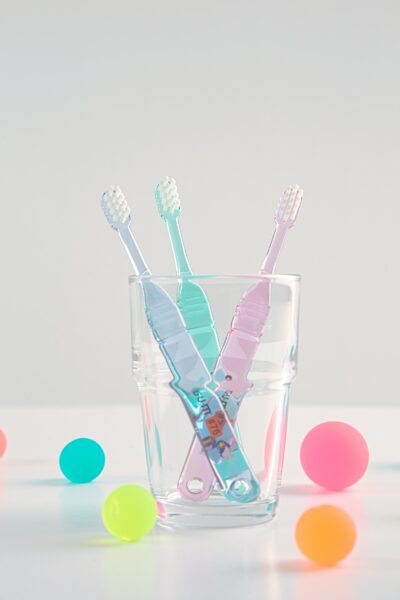
Gum Care
Infants have less saliva than adults, so they need help getting rid of the bacteria in their mouth. Start by gently wiping the gums with a silicone finger brush or clean gauze after feeding. Wipe down your baby’s gums at least twice a day.


Most babies’ teeth begin to appear between 6 and 12 months of age. Before this milestone, it’s important to care for your baby’s gums. There are three phases of oral health for infants.

Infants have less saliva than adults, so they need help getting rid of the bacteria in their mouth. Start by gently wiping the gums with a silicone finger brush or clean gauze after feeding. Wipe down your baby’s gums at least twice a day.
As each baby tooth gets to the surface of the gum, the gum opens up to show the tooth. The gums around the emerging teeth may be swollen and tender. Discomfort from teething, which may start as early as three months, can wake babies and make them fussy. Usually something hard and cold feels good on teething gums. A chilled teething ring; a wet, partly frozen face cloth; or a teething toy can help relieve the discomfort. If your child is extremely irritable, you can give them baby Tylenol. Be smart with unregulated homeopathic medications as some may contain sedative ingredients.
As soon as your baby’s first tooth emerges it needs to be brushed with a small-headed, soft-bristled toothbrush. Place the the brush on the gums and teeth and gently brush to remove food and plaque.
Many babies do not like having their teeth brushed and it takes time to get used to the new routine. If you are having difficulty, contact us for advice.
Until your child has adequate manual dexterity (for example, the ability to tie shoelaces by themselves), you need to help them with brushing. Brush twice a day, especially after the last meal or nursing session of the day.

We recommend that all children in British Columbia use fluoridated toothpaste. This is because tap water in BC is not fluoridated. Fluoride makes teeth more resistant to cavities and stops cavity-causing bacteria. All toothpaste brands make good toothpaste. Many organic all-natural toothpaste companies offer anti-cavity toothpaste with fluoride. For your infant, make sure that the amount of toothpaste you use is no larger than a grain of rice.
If you are not comfortable with fluoride, our office offers MI paste, which strengthens teeth with calcium and phosphate. If you want all-natural option, consider toothpaste with xylitol. This is the best alternative to flouridated toothpaste.
Flossing is the only way to remove dental plaque accumulated between two teeth. As soon as two teeth touch, they should be flossed once a day. It’s important to establish a good oral hygiene routine early. Your child will require supervision until they have enough dexterity at about eight years of age.
You can start by using floss sticks and gradually move on to floss string, which is better at removing plaque than a pre-threaded flosser or floss holder. If you have any difficulties flossing your child’s teeth, talk to Playtime pediatric dentists for tips.

Breastfeeding for the first six months of a baby’s life has proven to be beneficial. After age one, we recommend stopping nighttime breastfeeding and on-demand breastfeeding to prevent baby teeth cavities. This is because many toddlers demand breastfeeding for comfort rather than nutrition. Prolonged exposure to breast milk for comfort can cause cavities on baby teeth. You can continue to breastfeed your child for nutrition at a scheduled time that works for you and your baby.
Be smart with nighttime feeding as any milk (cow’s or breast) contains sugar and can cause decay if left on teeth overnight. To prevent tooth decay, be sure to brush teeth or clean gums before putting your baby to bed.
If there are latch issues with breastfeeding, lip and/or tongue tie can be the reason. Contact us or a lactation consultant for examination.
Remember to clean teeth and at the very least wipe the teeth and gums with a clean finger after bottle feeding, especially in the middle of the night.
The Canadian Dental Association recommends the assessment of infants by a dentist within six months of the eruption of the first tooth or by one year of age. The goal is to have your child visit the dentist before there is a problem with their teeth. In most cases, a dental exam every six months will let your child’s dentist catch small problems early. Taking your child to the dentist by age one allows you to find out if the cleaning you are doing at home is working. It also allows the dentist to find any problems, such as early childhood tooth decay.
Other factors such as pacifier habits, baby bottle tooth decay and finger-sucking habits can be discussed with your dentist. As dental health professionals, it’s important to us that our patients and their parents learn the proper at-home care. We take the time to educate parents and are here to answer any questions you may have.
Playtime Pediatric Dentistry is amazing! They take the time to help your child feel comfortable by playing with them and showing them the instruments and tools used. Play is their key focus with providing exceptional dental care! My child was happy visiting the dentist.
J.T.